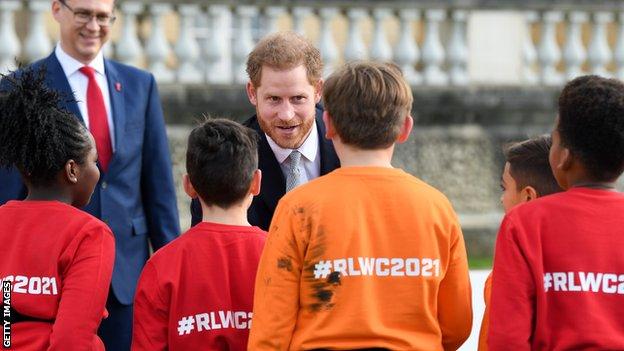Rugby League World Cup: Social impact report claims £25.8m boost to ‘deprived’ northern communities
Rugby League #RugbyLeague

 Prince Harry helped launch the Rugby League World Cup’s Mental Fitness Charter in January 2020
Prince Harry helped launch the Rugby League World Cup’s Mental Fitness Charter in January 2020
The Rugby League World Cup has led to £25.8m of investment in local communities, says a new report looking at the social impact of the tournament.
The report says the event has led to improvements in facilities, access, physical and mental health, and economies in deprived areas.
Secretary of State for Digital, Culture, Media and Sport Nadine Dorries called the programme “trailblazing”.
The pandemic-delayed 2021 World Cup begins in Newcastle in October.
The five-week competition is being hosted at stadiums in 17 towns and cities in England, with all but two located in the north – Coventry and London are the two exceptions.
For the first time the women’s and wheelchair tournaments will be held simultaneously with the men’s, with all 61 games shown on BBC channels.
England was awarded the World Cup in 2016, with their bid backed by government promises of significant funding to the game and community development.
The report, written by two independent agencies – The Sports Consultancy and Substance – says an initial £635,000 investment into the social impact scheme by tournament organisers has grown to nearly £26m of funding from organisations including Sport England, The National Lottery, DCMS and the Arts Council.
Achievements so far, according to the report, include new facilities for rugby league, including 38 new clubhouses, 18 pitches and four gyms – with better access for users with disabilities – as well as mental health programmes, volunteering schemes, and investment in schools.
Speaking at a launch event in St Helens, Dorries talked of the “legacy” that international sports tournaments like this aim to leave behind.
“We know that some of the towns and cities that will host Rugby League World Cup 2021 matches are among those hardest hit by the pandemic and increases in the cost of living,” Dorries said.
Even before the tournament has begun, Dorries claimed, the programme has improved access to the sport and “made a tangible difference”.
Wheelchair rugby league has received 52 new wheelchairs so far and clubs have received grants, such as the £17,000 given to Sheffield Eagles to buy equipment.
An inclusive volunteering programme has produced 1,000 people to help deliver the tournament, and includes volunteers with physical and learning disabilities.
The report says that hundreds of mental health workshops have also taken place “to improve the mental fitness, literacy and resilience of young athletes, coaches and parents”.